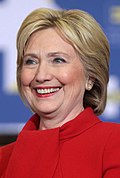This article needs additional citations for verification .(June 2016) |
| ||||||||||||||||
| ||||||||||||||||
 Results by municipality Hillary Clinton Bernie Sanders No votes | ||||||||||||||||
The 2016 Puerto Rico Democratic presidential primary took place on June 5 in the U.S. territory of Puerto Rico as one of the Democratic Party's primaries ahead of the 2016 presidential election.
Contents
Clinton was a heavy favorite to win the territory's primary. In her two terms as United States Senator from New York, the state with the largest population of Puerto Rican-Americans, she gained a strong degree of familiarity with the island. Those connections helped her build institutional support from top Puerto Rico Democrats, including then-Governor Alejandro García Padilla. [1]
No other Democratic or Republican primaries took place on the same day. The Republican Party's Puerto Rico primary took place on March 6, 2016.

